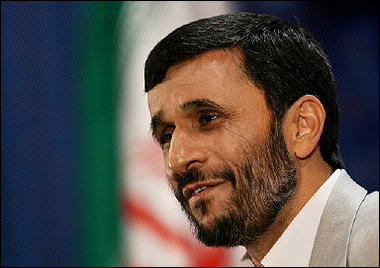Iran's hardline President Mahmoud Ahmadinejad rejected a UN Security Council
demand to halt sensitive nuclear work and warned that the Islamic republic could
quit the Non-Proliferation Treaty.

Iran's hardline
President Mahmoud Ahmadinejad has rejected a UN Security Council demand to
halt sensitive nuclear work and warned that the Islamic republic could
quit the Non-Proliferation Treaty.[AFP] |
The United States, meanwhile, said the Council would consider a draft
resolution that would oblige Iran to comply or face possible military action.
In a show of defiance just days away from Friday's deadline set by the
Security Council for Iran to freeze uranium enrichment, Ahmadinejad confidently
dismissed any threat of sanctions or even a US attack.
And in his latest vitriolic attack against arch-enemy Israel, the firebrand
leader said the "fake" Jewish state "cannot survive" and called on migrants to
the country to go back to where they came from.
"They shouldn't think they can baptise a wrong decision with the help of the
Security Council," he said of demands that Iran stop enrichment, at the centre
of fears that the Islamic regime could acquire nuclear weapons.
Iran says it only wants to enrich uranium to make reactor fuel to generate
electricity, as is authorised by the Non-Proliferation Treaty (NPT) -- the
cornerstone of efforts to avert the spread of nuclear weapons.
But the Security Council wants a suspension of the work -- which can be
extended to make weapons -- pending the completion of a now three year-old and
still inconclusive probe by the UN's International Atomic Energy Agency (IAEA).
"Our policy is to work within the NPT and the Agency," Ahmadinejad told a
news conference. "But if we see that they don't want to accept our rights, we
will reconsider."
The regime's increasingly defiant stance leaves it exposed to the risk of UN
sanctions. The United States has also not ruled out the possibility of taking
military action against the oil-rich Islamic republic.
At the United Nations in New York, US ambassador John Bolton said the
Security Council was to consider a draft resolution that would legally require
Iran to comply with demands that it freeze all uranium enrichment activities.
"Our expectation would be that assuming no change of direction by Iran and
there's no reason to think there will be a change of direction, we'll look at a
'Chapter 7' resolution to make mandatory all the existing IAEA resolutions," he
said.
Chapter 7 of the UN Charter, which is invoked in case of threats to
international peace and security, can open the door to sanctions or even
military action.
But Ahmadinejad was unmoved by the warnings.
"I see it as unlikely that they would be so unwise to do such a thing," he
replied confidently when asked about the impact on Iran's economy if sanctions
are imposed.
"Those two or three countries who are so against us have enough sense not to
make that mistake. They cannot create limitations for us. They will lose
themselves. Our economic infrastructure is strong," he asserted.
"A military attack does not make sense. Besides, our people are powerful and
can defend themselves," he argued, before firing off a stiff warning to
Washington.
"If they even talk about it, their situation will be very bad ... This is all
psychological pressure and propaganda that they use in the form of words in the
media to try to make us back down."
Iran's defence minister also warned the United States that it risked a
"disgraceful defeat".
"If the US chooses the military option, a disgraceful defeat worse than the
failure in Tabas desert awaits them," Mostafa Mohammad Najar said, referring to
a failed US attempt to rescue American hostages seized at the US embassy in
Tehran after the 1979 Islamic revolution.
In London, British Prime Minister Tony Blair called for the world to send "a
signal of strength" to Iran, but insisted "nobody is talking about military
invasion".
"So the real thing for me in respect of Iran is what are we going to do about
it? All I'm saying is ... it's not advisable at this moment in time to send a
signal of weakness. We want to show a signal of strength," Blair said.
Ahmadinejad, who triggered international outrage last year with his call for
Israel to be "wiped off the map," also continued his verbal barrage against the
Jewish state.
"Logically, this fake regime cannot survive," he said, adding that Jews who
have settled in the former Palestine "will return to their
motherland."